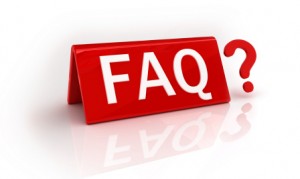
I thought you might find it helpful to have the answers to the six questions about Bank On Yourself we’re most often asked – right at your fingertips.

How many of these questions have you been wondering about?
![]() FAQ #1: How does Bank On Yourself compare with traditional investing and savings strategies?
FAQ #1: How does Bank On Yourself compare with traditional investing and savings strategies?
You can compare the Bank On Yourself method to traditional investments here, including stocks and mutual funds, a 401(k), a ROTH plan, real estate, gold, commodities and several other investments.
If there’s a different financial product or strategy that you think can match or beat the Bank On Yourself method, I encourage you to take the $100,000 Challenge. If you’re right, you could pick up an easy $100K!
![]() FAQ #2: How does Bank On Yourself let you recapture every penny you pay for major purchases like cars, vacations, business equipment or a college education?
FAQ #2: How does Bank On Yourself let you recapture every penny you pay for major purchases like cars, vacations, business equipment or a college education?
I’ve summarized this in a short video overview of how Bank On Yourself works.
However, for a more detailed explanation, you’ll want to review Chapters 2, 6, and pages 52-54 of my best-selling book, Bank On Yourself. If you don’t have the book, we offer a 35% discount on it.
![]() FAQ #3: I’ve heard people like Dave Ramsey and Suze Orman say whole life insurance is a lousy place to put your money. Is a Bank On Yourself-type policy different from the kind they’re talking about?
FAQ #3: I’ve heard people like Dave Ramsey and Suze Orman say whole life insurance is a lousy place to put your money. Is a Bank On Yourself-type policy different from the kind they’re talking about?

This is one of my favorite questions! Why? Because it’s so darn easy to PROVE that this type of dividend-paying whole life policy is a totally different “animal,” and that most financial advisors and “gurus” don’t even know the first thing about it!

Don’t take my word for it! You can see proof of how a Bank On Yourself policy is different here.
![]() FAQ #4: How much does it cost to start a Bank On Yourself policy? Is there a minimum amount I have to start with? Is there a maximum amount I can put in?
FAQ #4: How much does it cost to start a Bank On Yourself policy? Is there a minimum amount I have to start with? Is there a maximum amount I can put in?
There is no cost for a Bank On Yourself Analysis that will show you all the bottom-line results you could get with Bank On Yourself.
Should you then choose to start a Bank On Yourself policy, the Bank On Yourself Professionals do not charge fees to design and implement your plan. They receive a commission from the insurance company, which has already been taken into account in the bottom-line numbers you’ll see.
Much like buying a TV or a couch, the costs of manufacturing and sales are already included in the price, or in the premium, in the case of a Bank On Yourself policy.
These Advisors also take a 50-70% pay cut when they design your policy this way. You can learn more about the specialized training the Bank On Yourself Professionals receive, and why they take such a big pay cut.
However, Bank On Yourself is not a one-size-fits-all plan. There’s no pre-set amount a person would put into a plan, because the policy would be customized to YOUR unique situation, goals and dreams.

If you’d like to see how a custom-tailored program could improve your financial picture, it’s easy to find out when you take advantage of a free, no-obligation Bank On Yourself Analysis here.
You can start at whatever level is comfortable for you. The upper limit is determined by your income and assets.
![]() FAQ #5: I don’t have a single dime left over at the end of the month. Where do I find the funds to start a Bank On Yourself plan?
FAQ #5: I don’t have a single dime left over at the end of the month. Where do I find the funds to start a Bank On Yourself plan?

Bank On Yourself Professionals are masters at helping people restructure their finances to free up seed money to fund a plan designed to help you reach as many of your short-term and long-term goals as possible – and as quickly as possible. Sometimes this can be done without impacting your lifestyle at all. Here are eight of the most common ways to find the money to Bank On Yourself.

![]() FAQ #6: How do I know if Bank On Yourself will work for me? And how do I get started?
FAQ #6: How do I know if Bank On Yourself will work for me? And how do I get started?
Bank On Yourself is not a magic pill. It takes a little patience and discipline. But if you have those traits, it pays a lifetime of benefits.

To find out what your bottom-line numbers and results could be (free and without obligation), just click this button:
You can also learn more about the step-by-step process involved once you’ve requested your free Analysis.
If you take the first step now, you could start to Bank On Yourself in as little as 60 days!
I hope this helps! If you still have a question or concern that hasn’t been answered, let us know below.


Nice writing. You are on my RSS reader now so I can read more from you down the road.
Allen Taylor
If I am retired and using my savings to live off am I a good candidate for Bank on Yourself?
People up into their 80’s start these plans-it all depends on what your situation and goals are-it may or may not make sense for you.
The best way to find out is to request a free Bank On Yourself Analysis that will show you the specific results you could get.
I have already talked with the insurance representative and have given him a go-ahead. I’m waiting now to hear back from him.
John K. McDonald
I believe the dollar is on it’s last legs and will collapse or be de-valued or both sometime in the next two years. Why would I want to invest in a dollar-based investment when I should be putting every penny in precious metals and commodities? When the collapse comes most investors will lose everything, including those that invest in your product.
I understand your concern and have addressed it in detail here.
I am uninsurable. I really don’t have any family that I can own a policy on. Do I have any way to do Bank on Yourself? Thanks.
You may want to speak with a Bank On Yourself Authorized Advisor to discuss possible options.
I am familiar with cash vale life insurance and its flexibility and tax advantgages.
I am also aware that the life company charges interest on loans from cash value.
Your video does not address this.
Any comment???
The interest you pay on policy loans ultimately benefits the policy owner. You will end up with the exact same cash value whether you borrow from the policy and pay it back at the interest rate the company charges as you would if you didn’t borrow from the policy.
I explain how this works on pages 100-103 of my book.
I have a question regarding the actual cost of the life insurance each month. I know that each policy is set up differently, but each month there is a cost of the insurance, the base premium. I also know that in my recent report from my BOY advisor, that nearly HALF of my monthly contribution to my policy ($1000 of a $2000 monthly commitment) would go towards the base premium. It seems this is where people say buy term instead. For $1000 a month, I could get a ton of term insurance. Can you address this issue. Thank you..
Yes. It absolutely “outweighs” the higher cost of the base premium. In fact, I have dividend-paying whole life policies I started before I ever knew there was such a thing as a Paid-Up Additions Rider (PUAR), and even those policies are now growing at a terrific pace and soundly trashing the long-term returns I’ve gotten in the stock market.
There is nothing wrong with paying base premium! Buying term insurance is like renting a house – you’ll have nothing to show for the money you spend on it unless you happen to “get lucky” and die during the term of the policy. Even Suze Orman and Dave Ramsey note that term insurance is DESIGNED to terminate before YOU do – 99% of them never even pay a claim!
I’ve asked your advisor to connect with you to show you how the death benefit of the Bank On Yourself policy he designed for you has an exponentially increasing death benefit, in ADDITION to an exponentially increasing cash value.
A policy I started 4 years ago already has a death benefit that has almost doubled since it was issued.
Please feel free to address any other questions with your advisor as he is very knowledgeable and patient.
Let me clarify my question a little as well. Does the lifetime cost of the base premium really make it worth it. When you compare the overall cost of the base premium over the life of the policy outweigh the gains you get from the money you put into PUA riders and cash value?